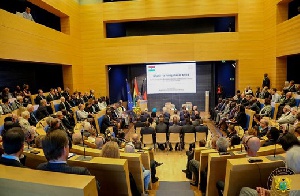 Section of the gathering at KAS listening to President Akufo-Addo
Section of the gathering at KAS listening to President Akufo-Addo
President Nana Addo Dankwa Akufo-Addo recently told a group of German investors that Ghana was open for business in the light of the reforms his administration had put in place within the last five months to make room for more foreign investment.
Speaking on Tuesday in Berlin at an event organised by the Konrad Adenauer Foundation, the President, who spoke on the theme, “Ghana, A Rising Star of Africa,’ said his administration was bent on building a business-friendly economy that would enable Ghana become a prosperous nation, beyond aid.
He noted that over the last five months, certain key measures had been directed at achieving fiscal responsibility and discipline, addressing corruption and unresponsive bureaucracies, and focusing on the productive sectors of the economy to improve the business environment.
The foregoing, he intimated, were all aimed at attracting private investment, both domestic and foreign, into Ghana, adding that Ghana, by those, would become “a land of opportunity for private capital.”
Targets
President Nana Akufo-Addo disclosed that by the end of this year, Ghana would be an easier place to conduct business with all transactions at her ports becoming paperless.
He said all internal custom barriers at the ports would be a thing of the past by the beginning of September.
“As part of the process of formalising the economy, we will implement a digital property addressing system for Ghana this year, and also issue biometric national identification cards to residents this year, so that every resident will have a unique identification number.
“Those of you who have been to Ghana might discover that you might be able to take a taxi and simply give an address, instead of our traditional the second left after the big tree and right where the woman roasts plantain,” he added.
Jobs
President Akufo-Addo reiterated his commitment to creating the space for the private sector to create jobs for Ghanaians.
“Our industrial regeneration, through our policy of 1-District-1-Factory, our agricultural revival, through the programme for Planting for Food and Jobs, targeted infrastructural development, especially of our roads and railways, and promoting access to digital technology, are going to be the main avenues for job creation,” he stated.